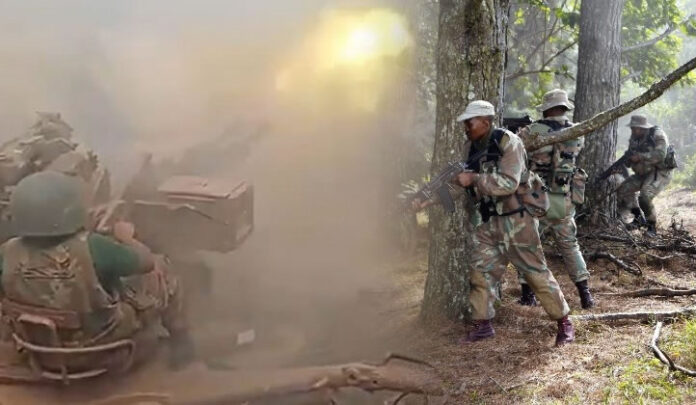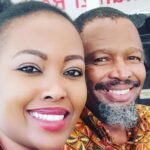At least 700 people have been killed in intense fighting in Goma, the largest city in eastern Democratic Republic of Congo (DRC), since Sunday, the United Nations has confirmed.
The conflict, which has seen M23 rebels – backed by Rwanda – capture the capital of North Kivu province, has left 2,800 people injured and sparked fears of further escalation as the rebels advance south towards Bukavu, the capital of South Kivu.
A Fierce Battle Against the Odds
The details of the battle were revealed to Sunday World by an award-winning journalist who witnessed the deadly exchange of fire while researching his book in Sake. His account was corroborated by several government officials in both Congo and South Africa.
“It was a fearsome, bloody battle, which lasted for about 24 hours,” the journalist, who asked not to be named due to his prominence in the region, told Sunday World. He described how South African soldiers were left exposed and ambushed after members of the Armed Forces of the Democratic Republic of Congo (FARDC), who were leading the front line, surrendered to the M23 rebels.
Deputy Defence Minister General Bantu Holomisa confirmed the journalist’s account, stating, “The troops of the DRC surrendered. They were supposed to cover another flank; they disappeared, and all of a sudden, SA troops ended up being attacked by mortars and so on.”
Despite being outnumbered and outmanoeuvred, the South African soldiers fought with remarkable courage. “Your soldiers fought like heroes and killed more than 100 of the M23 rebels. I was there and saw it with my own eyes,” said a senior editor who also writes for an international publication.
Unconfirmed reports suggest that the SANDF may have killed as many as 600 rebels, with some estimates putting the figure at 960 or even close to 1,000. “It’s clear that our troops were let down by other troops, our neighbours,” Holomisa added.
A Heavy Toll
The SANDF released a statement confirming the deaths and explaining that three soldiers were killed on Monday when a mortar bomb was launched by the M23 rebels at their base. The statement also highlighted the bravery of the troops, who observed international war conventions by raising white flags to allow the M23 rebels to collect their dead.
“The flags were raised to allow the M23 rebels to collect the bodies of their dead soldiers; they were lying everywhere, and the heroic South African soldiers deserve to be praised as they also observed the international war conventions, which stipulate that whenever a white flag is raised, the shooting must stop,” the senior editor said.
Holomisa confirmed this account, adding that the gesture also allowed SANDF troops to evacuate their injured colleagues for medical attention.
A Strategic Setback for M23
Sources in Congo revealed that after collecting their dead, the M23 rebels cremated the bodies to conceal evidence of their heavy losses. This move underscores the significant blow dealt to the rebel group by the SANDF, despite the challenges faced during the battle.
Escalating Humanitarian Crisis
The fighting has worsened the humanitarian crisis in eastern DRC. Shelley Thakral, from the UN’s World Food Programme, said the city’s residents were running out of food, clean water and medical supplies.
“The supply chain has really been strangled at the moment if you think about land access, air access, when everything is closed down,” she told AFP.
Since the start of 2025, more than 400,000 people have been forced from their homes, according to the UN’s refugee agency.
Regional and International Involvement
The conflict has drawn in regional and international actors. The Southern African Development Community (SADC) regional bloc declared its support for DR Congo at a crisis summit in Zimbabwe. In a statement, the 16-member group “reaffirmed its solidarity and unwavering commitment to continue supporting the DRC in its pursuit of safeguarding its independence, sovereignty and territorial integrity”.
SADC has sent peacekeeping troops, primarily from South Africa, to DR Congo to combat armed groups like the M23 and restore peace in the mineral-rich region after decades of unrest.
Accusations and Denials
Thérèse Kayikwamba Wagner, the DRC’s foreign minister, told the BBC that Rwanda was illegally occupying her country and attempting to orchestrate regime change.
“We’re not interested in war, we’re not interested in annexation, we’re not interested in regime change,” Makolo told the BBC’s Newsday programme.
UN experts estimated last year that Rwanda had between 3,000 and 4,000 troops operating alongside the M23 in eastern DR Congo.
A Call for Peace
As the conflict continues to escalate, the international community is being urged to intervene to prevent further loss of life. The bravery of the SANDF soldiers, who fought against overwhelming odds, serves as a stark reminder of the human cost of war.
The people of Goma and the surrounding regions remain caught in the crossfire, with their lives hanging in the balance. The world watches as the DRC, once again, teeters on the brink of a full-scale humanitarian disaster.
Additional reporting by AFP and Reuters.










